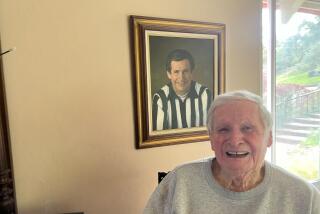Tagliabue Uses Schoolyard Skills as NFL Commissioner
NEW YORK — Paul Tagliabue was a successful Washington lawyer for two decades. Still, the political skills he’s used to persuade NFL owners to follow his lead came more from his teenage years on the schoolyards of Jersey City.
“I learned street smarts -- how to persuade, to cajole,” he says. “Sometimes you had to have a fist fight just to get on the basketball court.”
Tagliabue’s 15-year tenure as NFL commissioner should be winding down. He turns 64 in November and his contract expires in 13 months.
Instead, he could stay on for three more years after the 32 often-contentious owners agreed three weeks ago they wanted him in charge through upcoming labor and television negotiations. Street smarts can work particularly well when dealing with the networks.
Tagliabue may be lower profile than his predecessor, Pete Rozelle. But there’s no question he’s been a success.
“Literally on the run, he has retrofitted the entire NFL operation to make it the most successful in all of sports,” says NBA commissioner David Stern, one of the few people with firsthand knowledge of what Tagliabue’s job entails.
One measure of Tagliabue’s success is that since he replaced Rozelle in 1989, the NFL has been the only major professional sports league without a work stoppage.
That has helped him engineer deals for unprecedented figures. The last TV deal was $17.6 billion for eight years, and the new one will produce a lot more because football ratings are easily the highest in sports.
And the new NFL Network gives Tagliabue more leverage.
“The television situation is phenomenal, the relationship with the players’ union is great,” Pittsburgh owner Dan Rooney said in announcing the contract extension. “We’re entering an important period and we want him to continue to lead us through it.”
Tagliabue’s accomplishments stem largely from an early organizational change.
When Rozelle was commissioner, he ran daily operations but was subordinate to owner-run committees in several key areas, notably labor. That made him almost helpless to stop or end strikes like the ones in 1982 and 1987 that made his last decade as commissioner his worst.
Tagliabue’s biggest accomplishment came early, when he persuaded and cajoled the owners into giving him the power Rozelle lacked.
It’s easy to forget he almost didn’t get the job. It took seven months from the time Rozelle announced his retirement for the owners to elect Tagliabue over New Orleans general manager Jim Finks.
“I wanted a man with a football background,” Wellington Mara of the Giants said after his switch to Tagliabue helped end the stalemate. “But I’m satisfied. Maybe it will be like the time when Forrest Evashevski turned down the Green Bay coaching job and they had to settle for Vince Lombardi.”
To Mara and others, Tagliabue is indeed Lombardi; Mara and many of the “old guard” Finks supporters now are Tagliabue’s staunchest backers.
One major reason is labor peace.
When Tagliabue took office, there was no collective bargaining agreement. The 1987 strike had ended with no contract and the union filing an antitrust suit against the league.
The chief NFL negotiator was Jack Donlan, backed by a six-man committee that included four hard-liners: Hugh Culverhouse of Tampa Bay; Tex Schramm of Dallas; Joe Robbie of Miami; and Mike Brown of Cincinnati. One negotiating session ended when Schramm told union negotiators: “The owners are the stewards of the game and the players are the transient workers.”
Tagliabue changed that.
One of his first acts as commissioner was to sit down for a quiet, private dinner with Gene Upshaw, executive director of the union.
Then he insisted the owners revise NFL bylaws to give the commissioner control over all league committees. That allowed Tagliabue to replace Donlan with Harold Henderson and appoint less intransigent owners to the Management Council.
Still, it took two more years for the union to get a contract, prompted by a jury finding for the union in the antitrust suit. That resulted in, at Tagliabue’s urging, the owners agreeing to free agency. The players then agreed to a salary cap.
Since then, the CBA has been extended four times, the league and the union refer to each other as “partners,” and talks are beginning on extending the agreement beyond 2008.
“What Paul recognized is that the enemy is not the players,” Upshaw says. “As long as there is communication, there are not likely to be as many problems.”
That’s one example of Tagliabue’s schoolyard-honed political ability.
Another came on his first weekend as commissioner, when he chose to dispel what West Coast owners felt was an East Coast bias in the league office by flying west for personal visits with the owners of the Chargers, 49ers and Seahawks.
He is always open to advice.
A number of former Rozelle advisers remain among his most important aides. He relied heavily on the late George Young, who became the NFL’s vice president for football operations after retiring as general manager of the Giants after the 1997 season.
Upshaw also advises Tagliabue -- he had a major role in persuading him to call off games the weekend after the Sept. 11 attacks. Typically, the NFL led the way, getting other sports to postpone games.
Tagliabue also has pushed hard to add minorities in positions of authority in a league where more than 70 percent of the players are black.
In 1987, there was one black among the 200 or so league officials at the NFL’s annual meeting and no minorities in any important team or league offices.
Now there are five black head coaches; a dozen top team officials are black; plus there are high-ranking league executives such as Henderson and former players Gene Washington, Art Shell and Mike Haynes. Shell, who in 1989 became the first black head coach of the modern era, could end up with the position Young had in the league office.
Naturally, there also are dissenters.
Owners in smaller markets worry about a growing discrepancy in revenue in a league that set the standard for revenue sharing 40 years ago, when it agreed to an even split of television income.
During Tagliabue’s term as commissioner, 21 of the 32 teams have built new stadiums or renovated old ones, outfitting them with club seats and luxury suites. Some of the financing has been public, some private, and some has come from a league fund designed to loan up to $150 million for stadium construction.
But those without new buildings are at a disadvantage. Indianapolis owner Jimmy Irsay had to use his personal money for Peyton Manning’s record $34.5 million signing bonus. And luxury suites can go for far more in larger markets, giving those teams more up-front cash to spend on free agents.
“I think Paul has done a great job with labor, but I’m not so sure we need all those new stadiums,” Buffalo owner Ralph Wilson says. “In my opinion, all it does is increase the burden on small markets. We contribute to the stadium fund, but we can’t get a quarter of the money for a luxury suite that they can get in New York or Philadelphia.”
Tagliabue views his administration as a continuation of his predecessor’s -- adjusted to reflect the changing times.
“You can look at Pete as a public relations man and look at me as a lawyer,” says the former Georgetown basketball player. “But we share two attributes: We both love sports, and we realized that the team is more important than the individual. It’s more about ‘we’ than it is about ‘I.’ ”
Here’s the difference, one resulting from free agency and the salary cap:
Rozelle coined the phrase “on any given Sunday” to describe a league in which any team could win on any day. Still, during his administration, strong teams stayed strong from year to year and weak teams lingered at the bottom.
These days, a big loser can become a big winner almost instantly -- and vice versa.
“Now it’s ‘any given season,’ ” Tagliabue says.
He’ll be around for a few more of those.
More to Read
Go beyond the scoreboard
Get the latest on L.A.'s teams in the daily Sports Report newsletter.
You may occasionally receive promotional content from the Los Angeles Times.










